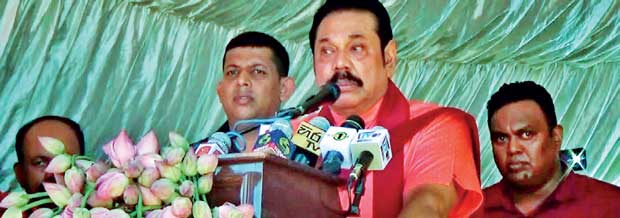Reply To:
Name - Reply Comment
Last Updated : 2024-04-19 00:03:00

Nationalism is likely to be the theme song in the months leading to the next series of elections with nationalist Mahinda Rajapaksa as the challenger
 Colombo, February 26: Good international relations are founded on political and economic stability in the countries concerned. If there is policy confusion and policy paralysis in a country, foreign investors’ interest in it tends to wane. And the confidence of foreign Governments about entering into economic and political agreements with that country begins to wear thin.
Colombo, February 26: Good international relations are founded on political and economic stability in the countries concerned. If there is policy confusion and policy paralysis in a country, foreign investors’ interest in it tends to wane. And the confidence of foreign Governments about entering into economic and political agreements with that country begins to wear thin.
Sri Lanka now appears to be the grip of political uncertainty which in turn has led to economic uncertainty. And the latter is bound to have repercussions for its relations with regional and world powers which are looking for investment opportunities in the island to fulfill their economic and strategic agendas.
After the political turmoil generated by the February 10 electoral debacle ceased last week, President Maithripala Sirisena and Prime Minister Ranil Wickremesinghe assured the nation of strong and meaningful action to fulfill their joint 2015 election mandate. But few Sri Lankans appear to be sanguine about a real departure from set biases and entrenched animosities and suspicions.
It is this condition which has been identified as the root cause of the Government parties’ dismal failure at the polls at the local elections turned national referendum on governance. Out of the 340 local councils to which elections were held on February 10, 239 went to the opposition Sri Lanka Podujana Peramuna (SLPP) led by the popular former President Mahinda Rajapaksa. The ruling United National Party (UNP), led by Prime Minister Ranil Wickremesinghe, came a poor second with 41 councils and the Sri Lanka Freedom Party (SLFP) and its allies won a mere 10.
The Government coalition partners have been roundly criticized by the SLPP and asked to resign, dissolve parliament and hold fresh elections.
Even as the Government was facing the onslaught from the opposition, its constituent political parties were also in turmoil internally. They blamed each other and demanded drastic internal changes too.
In the SLFP, there was a strong demand for quitting the alliance with the UNP on the grounds that the UNP’s right wing neo-liberal and pro-West economic and foreign policies were responsible for the electoral disaster. Those in the SLFP who sought a rupture of the alliance wanted to join hands with the SLPP ( which is but a breakaway group) to set up a new Left of Center and nationalist government.
When this proved to be difficult because of the opposition of the President, who loathes working with Rajapaksa, they started a movement to remove UNP leader Wickremesinghe from the Premiership and have him replaced by the more amenable Karu Jayasuriya, currently Speaker of parliament.
But the UNP would have none of it,despite serious differences with Wickremesinghe on his policies and style of functioning. The UNP stood by Wickremesinghe in return for reforms in the party structure.
The leaders of the SLFP then demanded that the President dismiss Wickremesinghe and appoint another. But the 19 th Amendment of the constitution would not permit that. It says that once appointed, the Prime Minister cannot be removed except when he is replaced by his own party or loses majority support in parliament in a vote on a money bill.
To mollify his party men, the President referred the matter to the Supreme Court and persuaded his followers to stick to the coalition with Wickremesinghe as Prime Minister till 2020.
The SLFP members agreed to this, but insisted that the economic development ministries should be taken away from the UNP and given to ministers from the SLFP. Alternatively, there should be a drastic reshuffle of the portfolios.
- Rajapaksa was able to combine populism with rapid economic development
- It is not clear as to what Government’s economic policy will be, as there is yet no overall plan
- Yahapalanaya regime is likely to get more populist and nationalistic in the run up to the 2020 Presidential and parliamentary elections
But as Sunday’s reshuffle shows, taking away the economic ministries from the UNP is impossible as by a 2015 agreement, the UNP will handle economic matters.Therefore the President adopted the expedient of using his National Economic Council (NEC) to lay down policy and review policy. The President used the cabinet to reverse the plan to distribute 70,000 tablets in rural schools. He used the NEC to lift the ban on Glyphosate, a weedicide, the ban on which had been destroying the tea and rubber plantations.
It is not clear as to what Government’s economic policy will be, as there is yet no overall plan. Changes are likely to come piecemeal rather than in one go. However, the overall direction is likely to be populist and nationalistic, to match Rajapaksa’s in the run up to the provincial elections and the Presidential and parliamentary elections in 2020.
But while Rajapaksa was able to combine populism with rapid economic development , with Chinese and Indian aid, the ‘Yahapalanaya’ or Good Governance Government has not been able to. It has neither executed infrastructure projects nor implemented populist programs.
The incumbent regime has failed even on the ethnic reconciliation front. It promised Transitional Justice Mechanisms, none of which has been established. There is no Independent Judicial Mechanism to try war crimes cases, and the Office of Missing Persons is yet to be set up. Only land occupied by the armed forces from Tamil civilians has been given back, mostly. The fear of losing the support of the majority Sinhalese has made it renege on its promises to the Tamil minority.
The failure on the reconciliation front has irked the UN and the West. The UN Human Rights chief, Prince Zeid, has asked the UNHRC to consider other strategies, like the extension of Universal Jurisdiction to Sri Lanka. Universal Jurisdiction will grievously erode Sri Lanka’s sovereignty.
The leaders of the SLFP then demanded that the President dismiss Wickremesinghe and appoint another
Projects in limbo
The Yahapalanaya Government is generally perceived as being friendlier to India than the earlier one led by hard core nationalist MahindaRajapaksa. But paradoxically, it was during Rajapaksa’s time that over US$ 1.1 billion worth of Indian projects were implemented. Under the Yahapalanaya Government, Indian proposals are languishing for want of interest in the Sri Lankan government.
With nationalism likely to be the theme song in the months leading to the next series of elections with nationalist Rajapaksa as the challenger, reviving these projects will be an uphill task.
 Projects which are pending are: the LNG-fired 500 megawatt power plant in Kerewelapitiya; the LNG Terminal/Floating Storage Regasification Unit (FSRU) in Kerawalapitiya; piped gas distribution system and retail outlets for the supply of Compressed Natural Gas (CNG) to the transportation sector; a 50 MW (extendable to 100 MW) solar power plant in Sampur in the Eastern Province;joint development of the 84 giant oil tanks in the Upper Tank Farm in Trincomalee; a port, a petroleum refinery and other industries in Trincomalee; Industrial Zones or Special Economic Zones in various parts of Sri Lanka; and building the Mannar-Jaffna, Mannar-Trincomalee highway and theDambulla-Trincomalee Expressway.
Projects which are pending are: the LNG-fired 500 megawatt power plant in Kerewelapitiya; the LNG Terminal/Floating Storage Regasification Unit (FSRU) in Kerawalapitiya; piped gas distribution system and retail outlets for the supply of Compressed Natural Gas (CNG) to the transportation sector; a 50 MW (extendable to 100 MW) solar power plant in Sampur in the Eastern Province;joint development of the 84 giant oil tanks in the Upper Tank Farm in Trincomalee; a port, a petroleum refinery and other industries in Trincomalee; Industrial Zones or Special Economic Zones in various parts of Sri Lanka; and building the Mannar-Jaffna, Mannar-Trincomalee highway and theDambulla-Trincomalee Expressway.
India and Sri Lanka had agreed to sign the Economic and Technical Cooperation Agreement (ETCA) by end of 2017, but there was so much of opposition to it from Sri Lankan businessmen and professions that prospects of signing it are dim especially because the Yahapalanaya regime is likely to get more populist and nationalistic in the run up to the 2020 Presidential and parliamentary elections.
On the contrary both the President and the Prime Minister are comfortable with China despite their opposition to Chinese projects signed in by Rajapaksa. In fact, after delaying the Chinese projects for about a year and a half, the Yahapalanaya regime entered into agreements with China which were more favorable to the Chinese than was the case before.
Sri Lanka and Pakistan had signed a Free Trade Agreement in 2002, but till date, bilateral trade has not gone beyond US$ 247 million. According to experts, the potential is as high as US$ 2.7 billion per annum, but this is not exploited because of a lack of political will.
Bangladesh has been trying to build trade and investment ties with Sri Lanka, but still bilateral trade is only US$ 142 million per annum. This is because of an absence of a welcoming culture in Sri Lanka due to nationalism and fears of a massive influx from Bangladesh. In contrast, the more progressive Bangladeshishave welcomed and hosted Sri Lankan investors.
Having been under colonial rule continuously from 1505 to 1948, modern day Sri Lankans are naturally wary of foreigners. A mixture of constricting nationalism and political instability has prevented Sri Lanka from seizing opportunities thrown up by the world around it.

Add comment
Comments will be edited (grammar, spelling and slang) and authorized at the discretion of Daily Mirror online. The website also has the right not to publish selected comments.
Reply To:
Name - Reply Comment
On March 26, a couple arriving from Thailand was arrested with 88 live animal
According to villagers from Naula-Moragolla out of 105 families 80 can afford
Is the situation in Sri Lanka so grim that locals harbour hope that they coul
A recent post on social media revealed that three purple-faced langurs near t

10 Apr 2024
09 Apr 2024